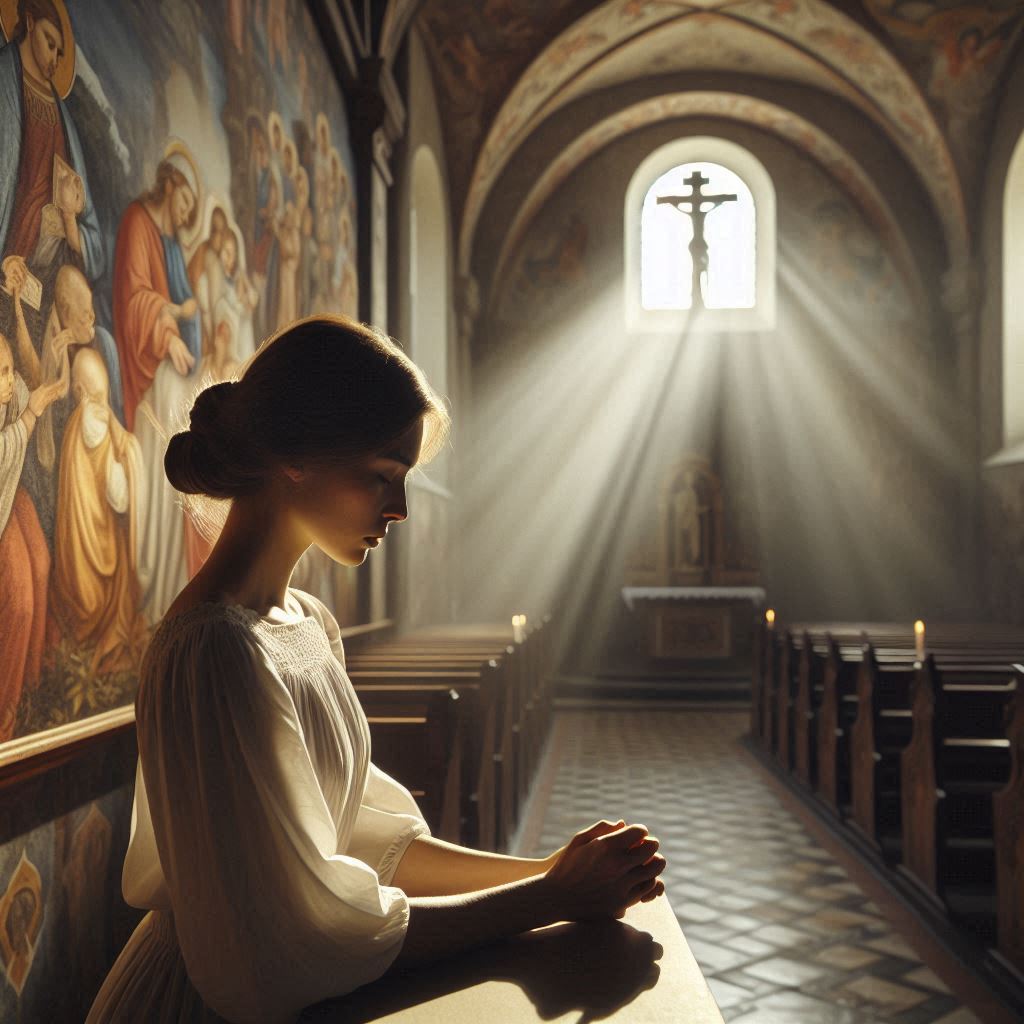Studying and learning from the lives and practices of the great Christian mystics completely transformed my life for the better. And on my Dancing Spirit Tours—in which I guide groups of people around pilgrimage routes and other sacred sites —I have seen Christian mysticism transform the lives of countless others. I want the same for you, my friend! I started the Holy Rebels podcast so that I could bring the wisdom and transformative potential of Christian mysticism to an even wider audience.
In this post you’ll come to understand more about the following:
- What is a mystic?
- How can you be a mystic, and why would you want to?
- What is Christian mysticism specifically?
- What can you look forward to in future podcast episodes and posts from Holy Rebels?
What Is A Mystic?
One of my greatest influences is a 16th-century Carmelite Christian mystic named John of the Cross. With a burning passion in his heart to form a more direct connection with God, he once proclaimed the following:
“I no longer want just to hear about You, Beloved Lord, through messengers; I no longer want to hear doctrines about You, nor to have my emotions stirred by people speaking of You; I yearn for Your presence. These messengers simply frustrate and grieve me because they remind me of how distant I am from you. They reopen wounds in my heart and they seem to delay Your coming to me. From this day onwards, please send me no more messengers, no more doctrines. They can not satisfy my overwhelming desire for You. I want to give myself completely to You and I want You to give yourself completely to me. The love, which You show in glimpses, reveal to me fully. The Love, which you convey through messengers, speak it to me directly. I sometimes think you are mocking me by hiding yourself from me. Come to me, Beloved, come to me with the priceless jewel of Your love.”

I find this sense of frustration to be very relatable. Where once the Church and the Bible were great sources of inspiration, comfort, and closeness to God for many people, that is becoming an increasingly less common story today. Like John of the Cross, we feel as though there is not much to grasp onto. These are exactly the feelings that form the basis of Christian mysticism. If you feel this way, then you just might be a mystic!
Why Be A Mystic?
As historian of religion Jeffrey J. Kripal explains,
“The mystic wants to know salvation personally, directly, and dramatically. But he or she has also come to the conclusion that the doctrines and rituals of the church are symbolic, that is, they point to actual states of the soul and not necessarily to anything literal or historical.”
Jeffrey J. Kripal, Comparing Religions
Becoming a mystic is a desirable thing for many people who feel dissatisfied with the more mainstream traditional narratives and doctrines of Christianity—or religion as a whole, for that matter. And yet, the lives and experiences of the great Christian mystics may seem as distant from us as God Itself. So, the first thing to recognize is that, yes, you, too, can be a mystic. As you dive more into Christian mysticism, do not be discouraged by how grandiose the words of the mystics are. Mysticism is attainable for everyone. Connection with God is there for the taking.
The next question is, do you want to be a mystic? What are the advantages of aspiring toward mysticism?
Proof Of God
Today, we find ourselves between two polarized worldviews about spirituality. In some parts of the world, especially in secularized North America and Europe, being religious is seen as kind of embarrassing. It’s viewed as irrational. It’s not uncommon for people to think that religion is dangerous or opposed to modern ideals. Those who are religious must be sheltered, naive, or just plain uneducated.
Strangely enough, at the same time, people love to call themselves spiritual. You’ll hear people say, I’m spiritual but not religious. So, on one hand, we reject religion and we experience shame around anything that represents “belief.” On the other hand, we yearn for a connection to the Divine. What’s accounting for this seeming contradiction?
The absence of proof.
We live in a society where we’re constantly searching for what’s real and what’s not—especially now in the age of AI. Despite wanting a connection to the Divine, we stop short of fully embracing religion. We feel it is wrong to believe in something that cannot be proved. And while it will not bring about the collective, objective proof of God that the world is at the edge of its seat hoping for, mysticism can absolutely prove the reality of the Divine to you in a convincing fashion, beyond any doubt.
Wonder
Historically, mysticism has been one of the central sources of inspiration for innovative ideas across fields from philosophy, art, and literature to science, astronomy, and archeology. Mystical experiences have generated meaningful cultural change, precisely because of the obscurity of the Source of its inspiration. We can say that mysticism is a form of spiritual creativity. It promotes exactly the kind of out-of-the-box thinking that leads to scientific and artistic breakthroughs that spur the evolution of our species. You will see what I mean in future episodes and posts—the one on Pierre Teilhard de Chardin, for instance, who was both an accomplished scientist and a Christian mystic.
This out-of-the-box thinking is attainable for everyone. It just needs a bit of a spark that is often missing from our adult lives. That spark that mysticism can help you tap into is, according to scholar of religion and psychology Robert C. Fuller, none other than the emotions of curiosity and wonder. For Fuller, these are the core of all religious experience, which are especially present in mysticism.
“Meditation and mystical practices temporarily deactivate a person’s accustomed way of experiencing the world. As a result, experience appears novel, fresh, unaccustomed. This alteration in our accustomed ways of making sense of the world introduces the element of surprise—the triggering mechanism for the emotions of curiosity and wonder.”
Robert C. Fuller, Wonder

Curiosity and wonder are so natural and ubiquitous for children. Everything is new for them. They are constantly discovering things for the first time, and their little brains are constantly growing. But, as we age into adulthood, we start to lose that little spark of creative energy. Life becomes more stale and predictable. If we wish to recapture the freshness of life that comes about through the state of wonder, mysticism is one of the most important tools we have access to.
Mysticism transcends the boundaries of time and space by reaching out to a reality that cannot be grasped by means of ordinary human cognition.
Peace And Love
Our world feels more divided than ever. Peace and love sometimes feel like total fantasies that are just as embarrassing to believe in for many people as the Divine Itself. But Love is the very core of Christian mysticism. All Christian mystics have described the identity of the Divine, and the experience of connecting with It, as fundamentally characterized by Love. It is that overwhelming presence of Love that spilled over, so that the great Christian mystics couldn’t help but spread peace and love in the world wherever they went.
Mysticism can heal the divides in our world because it not only fosters love, but genuine understanding as well. Mysticism is all about finding out what’s at the very heart of all religions. When you tap into your new life as a mystic, you come to see beyond all the little surface differences between different religious and cultural systems. You come to see that everyone is after the same things: wonder, meaning, love, peace.
As yet another scholar, Michelle Voss Roberts, notes,
“Regular practices of prayer and previous mystical experiences seem to predispose persons cognitively to appreciate the religious experiences of others. Participation in shared practices such as meditation, yoga, or service activities offers explicit points of contact between persons of different faiths. The interpersonal dimension of spiritual disciplines also contains the transformative seeds of wonder. When we experience deep interpersonal connections we awaken to a larger reality; and when we connect with a participant in another religious tradition we obtain a taste of their larger reality.”
Michelle Voss Roberts, Tastes of the Divine
Isn’t that beautiful? If we truly understood who we are and if we could see one another as brothers and sisters, there would be no war, no more hatred, no more cruelty, no more greed. The vantage point of mysticism transforms your life.
Mystical Traditions Of Eastern Religions
Christianity is the religion to which other religions are measured, especially in the United States. And so, for the people who are fed up with religion, Christianity is the paragon of that old, outdated, irrational system based on a silly belief in some man in the sky who watches over us.
By contrast, Eastern religions such as Hinduism, Buddhism, Daoism, Sufism, and so forth came to be viewed in a very different light in the Western world. This is partly the result of a shallow understanding of the Christian tradition and a romanticizing of the so-called exotic Eastern religions, which really caught fire in the countercultural movement of the 1960s and 70s.

The perceived subversive nature of Eastern mysticism seemed to fit the mold of a cultural movement that was all about rebelling against the status quo and old forms of knowledge and belief. There was a freshness and rebellious nature inherent in Eastern religions and their forms of mysticism.
But Christian mysticism can be just as rebellious. Many of the Christian mystics who are celebrated by the Church today were persecuted, even tortured for their ideas and beliefs in their own day—by the Church itself!
The intellectual tradition of Catholic theology and Christian mysticism is a broad, deep, and complex one. It would probably be highly interesting to those who are willing to look deeper, rather than resting on tired, popular misrepresentations.
By stepping into the world of mysticism—Eastern, Western, Christian, or otherwise—we all become Holy Rebels.
Christian Mysticism: Our Journey Together as Holy Rebels
Mysticism is not a frequently discussed topic. It’s often described in an esoteric way that makes it seem like mystical intimacy is reserved for the spiritual elite. Mysticism is vague and hard to understand because it happens in the deepest part of your soul, a part of yourself that is hidden from your own awareness.
This is WHY the Holy Rebels Podcast exists. In every episode, we’re going on an adventure into your inner landscape. In the process, we’ll learn about the history and development of Western mysticism, metaphysics, and theology. We’ll hear the personal stories of our spiritual ancestors, such as Julian of Norwich, Meister Eckhart, Mary Magdalene, Francis of Assisi, and many others. We’re going to demystify the mystical experience and make it universally accessible for everyone who feels drawn to its call.
Over the years, through our pilgrimages to sacred sites around the world, conferences with bestselling authors, and the many, many ceremonies in awesome places—from Stonehenge to Chartres Cathedral—I’ve been fortunate to meet hundreds of amazing souls all around the world who want the same basic thing: to live an inspired, meaningful life. Spirituality is important to them, but often, they’ve had negative experiences with organized religion. These brave souls have carved their own spiritual path. That’s what being a holy rebel is all about. And you are more than welcome to join us on this journey!
Frequently Asked Questions
Most of the world’s major religious traditions have a branch of mysticism associated with them. There is Christian mysticism, Jewish mysticism (referred to as Kabbalah), Islamic mysticism (known as Sufism), Hindu mysticism, Buddhist mysticism, and so forth.
Mystics do believe in God! God is the entire focal point of mysticism. Mystics wish to go beyond the point of believing in God; they want to experience God directly. Consequently, belief in God for mystics takes on a deeply personal, emotional, and sensorial dimension. It is not just a belief informed by faith and reason, but by overwhelming awareness of the reality of God that they feel deeply in their bones.
If you treat religion and spirituality as deeply personal pursuits centered around your own one-to-one relationship with God or whatever you consider to be divine, then you might be a mystic! If you want to go beyond normal linguistic thinking and theoretical ideas about God to experience the reality of the divine directly, then you might be a mystic!
Paragraph
Paragraph



